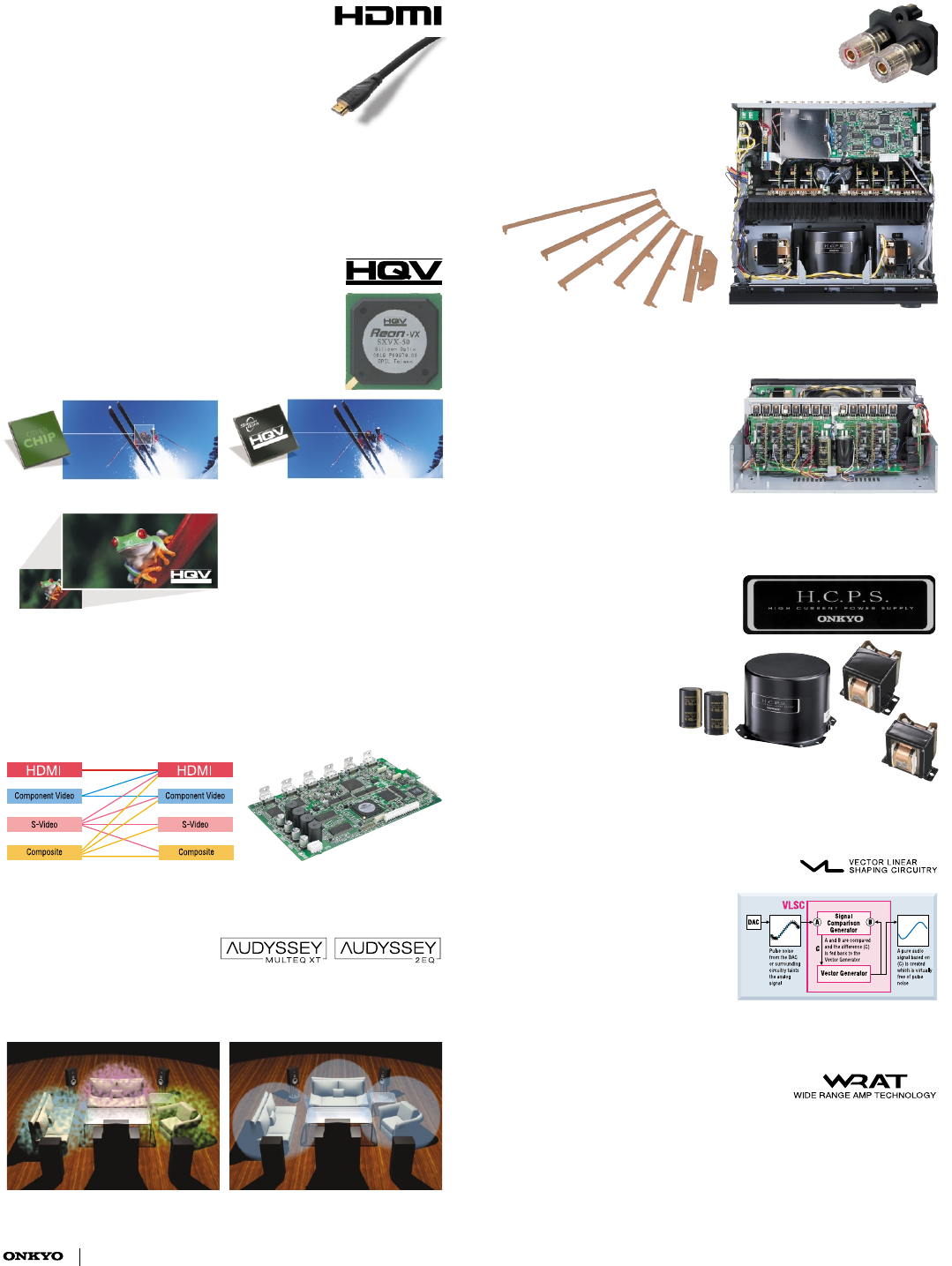
HQV Reon-VX Chip for High-Performance Video
Processing
Representing the most sophisticated video processing to be
seen in home theater components, the HQV Reon-VX
chip provides the ultimate support for standard definition
and high-definition deinterlacing; 1080p reconstruction of
film sources;filtering of jaggies and artifacts;and the
reduction of random,“mosquito”and block (codec) noise.
HQV Reon-VX also enables color region enhancement
and the rendering of more than one billion colors.
High-Definition Multimedia Interface (HDMI) for Pure
Digital Delivery
All the Onkyo A/V receivers released in 2007
incorporate HDMI, enabling a pure, all-digital 1080p
video signal to be sent through one connection.Those
with the latest version of HDMI (version 1.3a) become
powerful control centers for high-definition media.Even
multichannel audio—including the studio master quality
of the latest Dolby
®
Digital and DTS
®
formats (see
glossary for definitions)—can be digitally received and
processed for up to five channels. HDMI 1.3a will also bring you greater
bandwidth, Deep Color
™
, lip-sync correction and high frame rates.
Home Theater Components
4
Invigorating the 2007 A/V Receiver Line-Up—
Core Technologies That Make All the Difference
Fresh Approach to Internal Construction and
Amplification Design
The TX-NR905,TX-SR875 and TX-SR805 have been
designed so the power amplifier block and the pre-
amplifier coexist,but are perfectly isolated.Also, the power
supply parts of the left and right stages of each channel
are separated.The same receivers use a dual push-pull
amplification design with different
transistors on each channel to
separately amplify the positive and
negative halves of the waveform.The
whole design works to realize a highly
efficient drive capability.
Dual “Push-Pull” Amplification Design with Three-Stage
Inverted Darlington Circuitry
Dual push-pull amplification circuitry
uses different transistors on each
channel to separately amplify the
positive and negative halves of the
waveform.This circuitry has been
shown to improve the efficiency of the
relevant A/V receivers. Meanwhile,
three-stage inverted Darlington
circuitry helps reduce distortion.
Harnessing Power for Audio Performance
Onkyo’s High Current Power Supply
(H.C.P.S.) concept is based around
power transformers with the capability
to respond to the wide dynamics of
home theater. In the case of the
TX-NR905, a massive toroidal
transformer provides
efficiency and radiates less
noise into the surrounding
circuitry,while two separate
transformers cater specifically to audio
and video processing.You’ll also find two quality capacitors
(operating at up to 18,000 microfarads) that store the charge
demanded from an effective power supply.
Vector Linear Shaping Circuitry (VLSC
™
)
Onkyo’s VLSC employs a unique digital-
to-analog conversion circuit to mitigate
the effect of signal noise. Data is
converted between discrete sampling
points, which are then joined with
analog vectors in real-time to produce
a smooth output wave form.The
result—a noiseless, smooth analog
signal based on the digital source.
Wide Range Amplifier Technology (WRAT) Providing
Amplification Backbone
The cornerstone of any Onkyo A/V receiver,
WRAT supports high-quality audio
reproduction of the latest high-definition A/V
formats. It comprises three key components: (1) A low negative-feedback
design for cleaner audio across the frequency range; (2) Closed ground-loop
circuits to cancel individual circuit noise and keep the ground potential free of
distortion; and (3) A high instantaneous-current capability to handle speaker
reflex energy and impedance fluctuations.
1080p Video Upscaling and Analog Signal Upconversion
The TX-NR905 and TX-SR875 upscale the resolution of video signals all the
way to 1080p, to enable a single HDMI cable connection to a high-definition
display.Almost all Onkyo A/V receivers will upconvert video signals for output
via either HDMI or component video.
Audyssey Technologies for Room Acoustics Correction
Onkyo A/V receivers use Audyssey’s
MultEQ
®
XT or 2EQ
™
to counter
distortion in dedicated home
theaters.Both solutions focus on frequency response and time domain
(where most of the problems lie) across the entire listening area.The results
are immediately obvious—a clear, well-balanced and natural sound.
Sound stage is diffuse without Audyssey technologies. Audyssey technologies create a clearer sound stage.
HQV chips process pixels individually,
for enhanced pixel accuracy.
Standard chips process pixels in blocks,
creating unwanted artifacts.
Images scaled by Reon-VX contain 80% new
pixels to augment the original video data.
2007-2008_EU.qxd 07.9.20 2:21 PM Page 4










